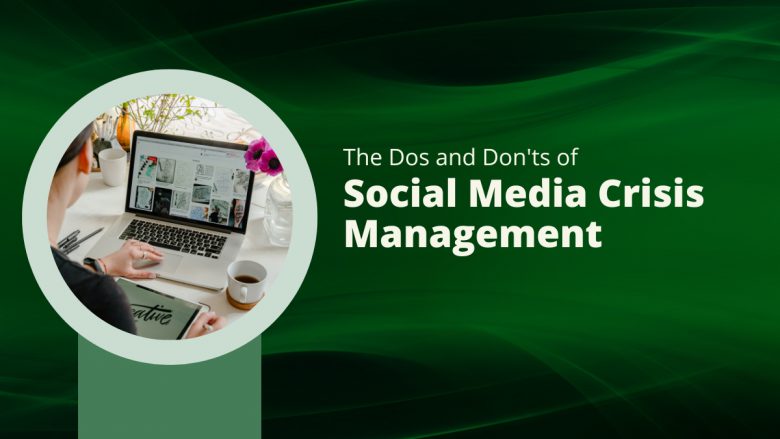
Social media has become a critical communication tool for businesses to connect with their customers, but it can also be a double-edged sword. When a crisis strikes, social media can amplify the impact of the situation and potentially damage a brand’s reputation. Effective crisis management is crucial to navigating these situations and maintaining brand credibility. Here are the dos and don’ts of social media crisis management:
Dos:
1. Respond quickly:
When it comes to managing a social media crisis, time is of the essence. Responding quickly can make all the difference in how the situation plays out. Delaying a response can give customers more time to voice their frustrations and potentially cause further damage to your brand’s reputation. In today’s fast-paced digital world, waiting even just a few hours to respond can seem like an eternity for customers who are used to instant gratification.
By responding quickly, you show that you are actively listening and taking their concerns seriously. This helps build trust with your audience and shows them that you value their opinions. Moreover, it allows you to address any misinformation or rumors that may be spreading on social media before they spiral out of control.
One way to ensure a quick response is by having a crisis management plan in place ahead of time.
2. Be transparent and honest:
In today’s digital age, social media has become a powerful tool for businesses to interact with their customers. However, it can also be a double-edged sword as any misstep or mistake made on social media can quickly escalate into a full-blown crisis. When faced with such situations, transparency and honesty are crucial in social media crisis management.
To effectively manage a social media crisis, it is important to be upfront about the situation and provide accurate information. Hiding behind vague statements or avoiding the issue altogether will only make matters worse. Customers want to know that you are taking responsibility for your actions and doing everything possible to rectify the situation.
Being transparent about who is responsible for the problem and what steps are being taken to address it helps build trust with your audience. This not only diffuses the current crisis but also strengthens your brand’s reputation in the long run.
3. Listen to your audience:
In today’s digital age, social media has become an essential tool for businesses to reach out to their audience. However, with great power comes great responsibility. Social media is a two-way communication channel, which implies that it’s not just about pushing out content but also about listening and engaging with your audience. In times of crisis, this becomes even more important.
To effectively address your audience’s concerns during a social media crisis management situation, you need to start by actively listening to them. Monitor all your social media channels closely and keep track of any negative feedback or comments related to your brand or product. Don’t ignore them; instead, acknowledge them promptly and provide solutions where possible.
It’s crucial to remain calm and professional during a social media crisis management situation; avoid getting defensive or confrontational with the audience as this can only worsen the situation.
4. Take responsibility:
When it comes to social media crisis management, taking responsibility is a crucial step that brands cannot afford to overlook. Whether it’s a product recall or a PR disaster, acknowledging the situation and apologizing for any harm caused is the first step in rebuilding trust with your customers. By doing so, you show that your brand is accountable and committed to making things right.
It’s important to note that taking responsibility doesn’t mean admitting fault if you’re not at fault. Rather, it’s about acknowledging the situation and its impact on those affected. This shows empathy towards your audience and demonstrates that you understand their concerns. Apologizing also helps diffuse tension and creates an opportunity for dialogue between your brand and its stakeholders.
However, apologies alone are not enough – actions must follow words. After apologizing, take action to address the issue at hand and prevent similar situations from occurring in the future.
5. Develop a crisis management plan:
In today’s digital age, social media has become an integral part of any brand’s marketing strategy. However, with the benefits of social media come certain risks as well. One negative tweet or comment can quickly spiral out of control and damage your brand’s reputation. The key to mitigating such risks is to have a crisis management plan in place.
A crisis management plan outlines a set of strategies and procedures that brands can implement in case of emergency situations. These plans typically include guidelines for communication, response times, and protocols for handling different types of crises. By having a solid crisis management plan in place, brands can respond quickly and effectively to any issues that arise on social media platforms.
One important aspect of developing a crisis management plan is understanding the potential risks involved with social media use. Brands should carefully monitor their online presence and be prepared to respond promptly to any negative comments or feedback.
Don’ts:
1. Ignore the situation:
In today’s world, social media is a crucial platform for businesses to connect with their customers. However, it also presents a potential crisis when things go wrong. Ignoring a social media crisis could be one of the worst mistakes that can be made in this digital age. Customers expect a response when they reach out to a brand on social media channels.
Ignoring the situation may seem like an easy fix, but it will only make things worse. Inaction can cause further damage to your brand reputation and customer loyalty. It is important to take control of the situation as soon as possible and address the issue head-on.
A company’s response to a crisis on social media can impact its long-term success or failure. Don’t let your business become another case study on how not to handle a crisis online.
2. Delete negative comments:
In today’s digital age, social media has become a crucial tool for businesses to connect with their target audience. However, with the increase in engagement comes the risk of negative comments and feedback. Many businesses make the mistake of deleting negative comments as soon as they appear on their social media pages. While it may seem like a quick solution to protect your brand’s reputation, deleting negative comments can actually cause more damage than good.
Deleting negative comments sends a message to your audience that you are not open to criticism or willing to address concerns. This can lead to a backlash from your followers who may start questioning your authenticity and credibility. Furthermore, deleting negative comments can also escalate the situation by making unhappy customers feel unheard and disrespected.
Instead of immediately hitting delete, businesses should approach negative feedback with an open mind and willingness to resolve issues.
3. Be defensive:
In today’s fast-paced world, social media crises are inevitable. However, how one responds to a crisis can either make or break their brand reputation. It is easy to become defensive or combative when responding to negative comments or feedback online. However, being defensive can only exacerbate the situation further and damage your brand reputation even more.
Therefore, it is crucial not to blame others or make excuses when faced with a social media crisis. Instead, focus on addressing the situation at hand by acknowledging the issue and taking responsibility for any mistakes made. This approach shows your audience that you take their concerns seriously and are willing to work towards finding a solution.
As much as possible, avoid using negative language in your responses as this can come across as aggressive or confrontational.
4. Misrepresent the facts:
Misrepresenting the facts or providing inaccurate information in a social media crisis can do more harm than good. With everyone having access to social media, it’s easier than ever for misinformation to spread like wildfire. The last thing you want is for your brand to be at the center of that fire.
To avoid this, it’s important not to make assumptions about any situation and only provide factual information. It might seem tempting to jump in and provide an explanation or justification for what has happened, but unless you have all the facts, it’s best to hold off on commenting. Inaccurate information can quickly spread and lead to a further backlash against your brand – potentially causing long-lasting damage.
In addition, always ensure that you are transparent with your audience about what’s happening.
5. Engage in arguments:
In the world of social media, businesses will inevitably face critics and unhappy customers. While engaging in an argument may seem like the best way to defend your brand, it can actually make the situation worse. When emotions run high, people are more likely to say things they don’t mean, and this can quickly escalate into a full-blown crisis.
That’s why it’s important to stay calm and professional when facing criticism on social media. Remember that your goal is not to win an argument or prove someone wrong; it’s to address their concerns and resolve any issues they may have with your brand. By taking a level-headed approach, you’ll be able to defuse tense situations and show your customers that you care about their needs.
If you find yourself in a heated exchange with a customer or critic on social media, take a step back and assess the situation before responding.
Conclusion:
In conclusion, social media crisis management is crucial for businesses to maintain their reputation and credibility on social media. Responding quickly, being transparent and honest, listening to your audience, taking responsibility, and having a crisis management plan are all essential dos for social media crisis management. Conversely, ignoring the situation, deleting negative comments, being defensive, misrepresenting the facts, and engaging in arguments are all don’ts that should be avoided. By following these dos and don’ts, businesses can effectively manage social media crises and maintain their reputation on social media.



One Comment